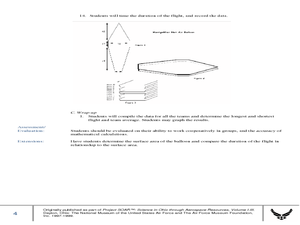Curated OER
Who is the Sea Otter Related to?
Students examine the genetic relationships of different organisms. In groups, they discover the importance of genes and how different amino acids show various evolutionary relationships. They use an online database to continue their...
Curated OER
Seasons and Cloud Cover, Are They Related?
Students use NASA satellite data to see cloud cover over Africa. For this seasons lesson students access data and import it into Excel.
Curated OER
Food for thought
Cake has to be good for something, right? Different foods are used by our bodies in different ways. Learners will first read about what fats, proteins, fruits, and vegetables do for the human body. They will then put each of food shown...
Curated OER
Magnets are forceful
You could use this worksheet two different ways. As is, or you could have learners actually do the experiment shown. They are to determine which magnet is strongest by counting the number of paper clips hanging from it. Why not get five...
Curated OER
Non-living Things
Very young scientists circle the things on the worksheet that they think are living things. Most of the pictures are of non-living things. A handy worksheet to use during any initial discussion about living vs. non-living things.
Curated OER
Antibiotics: Will They Work?
Students examine why antibiotics are important in everyday life. They examine the decisions that people make and how these decisions can artificially speed up natural selection in bacteria that cause infections such as group A...
Curated OER
Scientists Write!
Learners use a journal to record observations. They make notes about what research may be needed to answer questions that have come up in the field and sketch or make connections in the curriculum. They research bioinformatics and...
Curated OER
Plants are yummy!
Is it a fruit or a vegetable? Youngsters place an F next to each fruit they see and a V next to the vegetables. Corn is tricky. It is a grass, so it's actually not a fruit or a vegetable, but a grain!
Curated OER
HIV Prevention
Seventh graders engage in critical thinking skills about personal health and safety to prevent the acquiring of the HIV disease. The project is an extension of this thinking designed for students to think about all the different ways...
Curated OER
Evidence of Change Near the Arctic Circle
Learners analyze graphs and make conclusions about climate change. In this climates lesson students produce graphs and identify relationships between parameters.
Curated OER
Latitude
Students examine the theory of finding latitude and discuss the uses of an astrolabe, cross-staff and octant. They determine an Astronomical Table for their classroom.
Curated OER
Compass Deviation
Learners identify and describe the difference between the magnetic north pole and true north. They consider why sailors could not steer a straight course to the New World from the Old.
Curated OER
Malaria Introduction
Learners analyze three different strategies for controlling the spread of malaria. They examine the disease and how people catch it. Learners explore the life cycle of the malaria parasite.
Curated OER
Identifying Minerals
Learners compare and constrast a wide variety of minerals and rocks. They test them for streak, luster, color and other characteristics. They view an exhibit and compare their answers to them.
Foundation for Water & Energy Education
How Can a Dam Affect a River? Activity B
Second in a pair of activities, young ecologists continue to examine the food pyramid of a freshwater ecosystem. They take a look at the food pyramid drawn in Activity A and consider what would happen if a reservoir was created on the...
Curated OER
Vacancy: Habitats Available!
Sixth graders pick a native animal and write a classified housing ad to match the animal's habitat requirements, paste it on posterboard and then try to match each habitat with the animal it represents.
Curated OER
Module 1, Unit 2, Lesson Plan 2: PCR and DNA Diagnosis
High schoolers discuss the importance of the Polymerase Chain Reaction for biologists. They explain what factors make the Polymerase Chain Reaction possible. Students explain the steps in thermocycling and what happens during each step.
Curated OER
Tie Dye
High schoolers practice writing research proposals to test the color fastness of a dye once it has been exposed to a t-shirt. Each proposal needs details of experimental design, length of treatment, and means of cleaning the shirt. All...
Curated OER
Animal Keynote Report
Learners produce a research project on an animal. Using the Internet, they find pictures and information about animals. They are also given a list of items that should be covered in their report, including the appearance of the animals,...
New York City Department of Education
Egypt
This six-week unit encompasses all subjects with a focus study on world history and the development of ancient civilizations. As gifted and talented students dive into the interesting yet challenging topic of Egypt, they...
Curated OER
Up, Up and Away with the Montgolfier Balloon
Learners construct hot air balloons. In this science activity, students assemble their own balloon using tissue paper and glue. They time the duration of the flight, record data and calculate team averages.
Curated OER
Subject Selection in Clinical Trials
High schoolers design and conduct an experiment to test a hypothesis. They create a question/objective based on the results of their experiment that can be answered by performing a human clinical trial. Students write inclusion and...
Curated OER
Earth History Part II
Eighth graders hypothesize what caused the break up of continents. In this earth science lesson, 8th graders study about the events that took place during Mesozoic and Cenozoic Era. They reconstruct a supercontinent and report their...
Curated OER
Weather Instrument Use and Application
Eighth graders measure temperature, wind speed and pressure using Skymaster SM-28. In this earth science lesson, 8th graders collect data and record observations taken from outdoors. They explain why numerical values are different in...
Other popular searches
- Inquiry Based Science Lessons
- Inquiry Based Science Water
- Science Inquiry Based
- Inquiry Based Science Lessons
- Inquiry Based Science Sose
- Inquiry Based Science Souse
- Science Inquiry Based Learning























